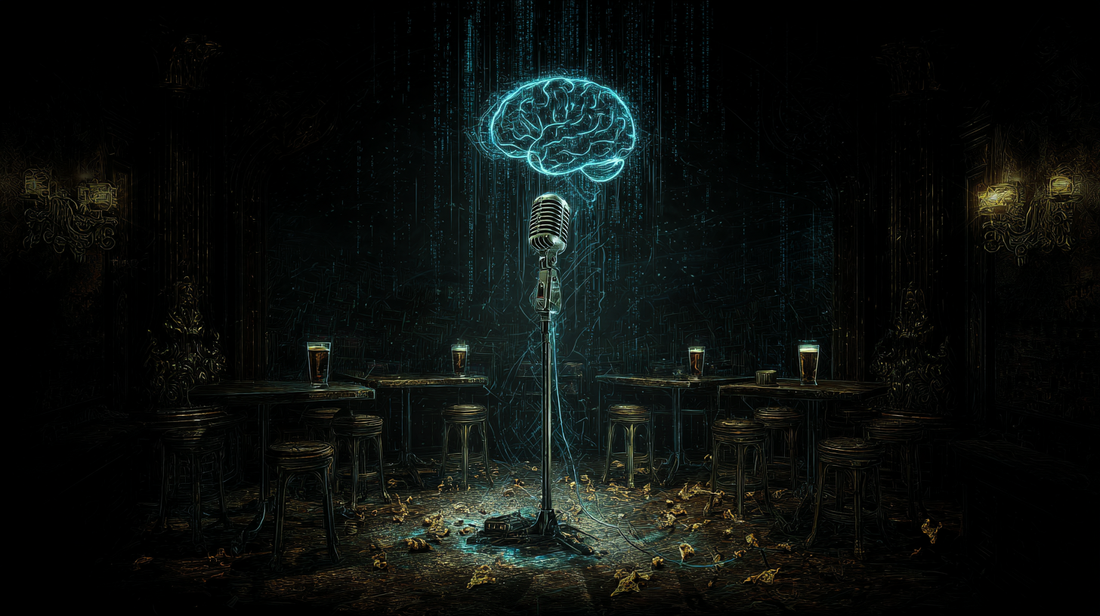
Can AI make us laugh?
Share
|
Hi... Let's start with a joke: A robot walks into a bar and asks for a screwdriver. About the level of a Christmas cracker joke, right? The joke comes to you directly from an AI chat system. Fresh from penning a novel where my protagonist is forced to navigate—and occasionally outwit—the ever-mutating beast that is artificial intelligence (Virtual Witness: Hard-Boiled Crime Meets Cutting-Edge Tech), this is the first of a trilogy of emails that tackle some of the most pressing questions about our new AI reality. Why? Well, after immersing myself in AI research to give the novel some level of plausibility, I thought I'd share the hard-won wisdom with you! And because AI is something we all have to take notice of, I suppose. The questions are: 1. Can AI make us laugh? 2. Can AI cure death? 3. Will AI make humans dumber? I'll give you the answers now, at least as far as I see them, but if you're so minded, you'll have to read the articles for more detail. In the same order above, the answers are: 1.Probably not. 2. Defintely maybe. 3. Absolutely yes. Can AI make us laugh? But when it comes to making us laugh, is it still stuck in thinking mode? I asked an AI 'Why are "Why did the chicken cross the road" jokes funny.' It replied: Because it subverts expectations by being aggressively unfunny. Not wrong. And then it added: Remember, the moment you have to explain why something is funny, you've killed the joke. Wow. Again, it's not wrong. I continued my probing. Me: Write me a joke. Me: Write me a joke with stronger humour, add a little noir. Clever, I suppose, but not quite there yet, is it? Are your sides splitting in uncontrolled laughter? Are you ready to fork out £50 for a ticket at London's O2 or $75 at New York's Carnige Hall to go watch an AI robot make you laugh? If you are, I suspect you're reading this in a pub and are on your third pint. I soldiered on. My wife, who was once a teacher, asked me to ask it how a teacher could use humour to control a class of unruly students: AI: Give all the students who misbehaved a pop quiz on quantum physics, “so you can enjoy the sound of silence.” I laughed. But then again, I am writing this from my local. Three pints in. The real issue, it seems to me, is that AI lacks the human nuance, the experience of humour rising up within your stomach and making its way to your mouth. The experience of what it means to laugh. I just don't see how that can ever be mimicked by a machine. Comedy is all about perspective. A comedians own twisted, wierd and wonderful view of the world, shaped by their biological experiences, their culture, and their own unique timing. AI can mimic joke structures, but it can’t draw from a life of disgust and fear and hate and love. It doesn’t know what it’s like to have someone turn you down when you ask them for a date, or to mess up that big presentation you've been working on for the last week. It can't get embarrassed, or jealous, or angry. It can't get anything. Can it? Comedians often say one thing and mean another; part of their craft is raising an eyebrow at the right moment so you understand this double-meaning. AI can’t pick up on that kind of delivery. At least I don't think it can. So, what actually makes something funny? Humour often comes from surprise—the sudden twist, the unexpected outcome, or the clever play on words. It can also come from shared pain or awkwardness, poking fun at life’s little frustrations, or simply the joy of the absurd. Timing, delivery, and context are everything. And, crucially, so is the ability to read the room. As far as I can tell, AI is nowhere close to mastering that. AI humour is built by pattern matching - as are the books it writes and the music it composes - not personal experience. It can generate puns by the truckload, and one-liners that barely rise above my own. And I'm not funny. Wish I was, but I'm not. And it cannot surprise us, not in the way a good comedian can. It has no background. It's just matching patterns based on a huge volume of information it has access to. These are the reasons that my answer to the question is 'NO'. Maybe, in some distant future, when robots have lived enough “life” to have their own stories, their own existential crises, they’ll develop a sense of humor that resonates with us.. Maybe I'm wrong (it has been known) and the age of the AI robot comedian is closer than we think. But I doubt it. I was thinking about this a while back when I wrote a short story about a washed-up comedian who gets an AI chip to help improve his act. You can download this for free from the link below: FREE DOWNLOAD: CHUCKLE MATTERHORN'S LAST LAUGH
 Virtual Witness - Hard-Boiled Crime Meets Cutting-Edge Tech When an AI chatbot claims it "witnessed" a detective's murder, legendary investigator Harry Hawkins is pulled from retirement into his most baffling case yet. Old-school detective instincts vs cutting-edge technology in a deadly game of artificial intelligence and international conspiracy. You can order the eBook directly from my website at RobsonBooks, from Amazon, Kobo or other retailers such as Apple, Barnes & Noble, Smashwords etc If you are in KOBO Plus you will be able to read the book as part of your subscription.
ROBSONBOOKSAMAZONKOBOOTHER RETAILERS
I'll be back shortly with the next pressing question. Can AI cure death? That's a tough one. |